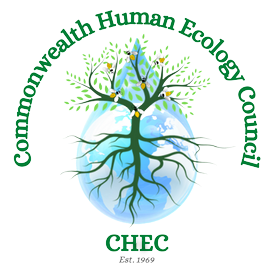The Commonwealth Human Ecology Council Newsletter - May 2019
The temperature is rising in London and CHEC has had an intense month with the release of our Journal and a big conference in Grenada. We are delighted to finally share our Journal, the 29th issue of Human Ecology, with all of you. This year’s Journal focuses on education for social understanding of sustainability.It is full of fascinating articles from students and professionals all over the Commonwealth, sharing their work and experiences of the importance of discovering nature while growing up.
During 21-23 of May, CHEC attended this year’s conferenceby the Council for Education in the Commonwealth. The conference took place in Grenada and the theme was: Students: OurCommon Wealth. A Focus on Students Success. A summary of the conference will be published on our website shortly.
In the beginning of the month we held a meeting with the Board members of CHEC to discuss the future of the organisation. We are looking forward to the following years and hope to receive the resources needed to continue with our work; to pursue sustainable solutions for the preservation and use of the planet’s natural resources.
This year, we have started a new project where we will interview the people behind the Commonwealth Human Ecology Council. This is an opportunity for all of you toget a better understanding of who we are and what we wish to achieve with our work. The first interview is already up, and another one will be published shortly. In the upcoming interview, we will meet Michael Mutter, CHEC Governing Board Trustee and Chartered Architect and Town Planner. He has extensive experience in international urban development, including long term on-the-ground experience in Nigeria, India, and most Commonwealth countries.
This month’s newsletter includes an update from CHEC’s Bee and Pollinator steering group, see below. They are doing a tremendous work and are currently in the start of identifying an innovative youth-led pilot project in Uganda that will train young marginalised women on beekeeping, biodiversity of crops, climate action and marketing.
During June, CHEC will focus onthe right to clean air for everyone. Follow us on Facebook orTwitter if you are interested in getting updated on the latest human ecology related news across the Commonwealth.
This month, the UN published the much anticipated IPBES report on the state of global biodiversity. The IPBEs is the abbreviation for the UN Intergovernmental panel on biodiversity and ecosystems services. It has the unique mandate to research and provide data on the world’s biodiversity and ecosystems. “Biodiversity and nature’s contributions to people sound, to many people, academic and far removed from our daily lives,” said the Chair of IPBES, Sir Robert Watson, “Nothing could be further from the truth –they are the bedrock of our food, clean water and energy. They are at the heart not only of our survival, but of our cultures, identities and enjoyment of life.”
The IPBEs first report was in 2016 on the subject of pollinators, which included bees and other pollinator animals. CHEC has been fortunate to work with the author of the IPBEs Pollinator report Dr Simon Potts who advised on our 2015 report Bees and Pollinators: A Commonwealth Concern launched at the Malta CHOGM. The work of the IPBES enables global expert researchers to focus on their regions and then compile data into one central agency for the UN.
This month’s landmark publication includes an alarming update on pollinators but covers biodiversity of all creatures including fish, animals, insects. “Biodiversity – the essential variety of life forms on Earth– continues to decline in every region of the world, significantly reducing nature’s capacity to contribute to people’s well-being. This alarming trend endangers economies, livelihoods, food security and the quality of life of people everywhere,” according to four landmark science reports released today, written by more than 550 leading experts, from over 100 countries.
The result of three years of work, the four regional assessments of biodiversity and ecosystem services cover the Americas, Asia and the Pacific, Africa, as well as Europe and Central Asia – the entire planet except the poles and the open oceans. The assessment reports were approved by the Intergovernmental Science-Policy Platform on Biodiversity and Ecosystem Services (IPBES), in Medellín, Colombia, at the 6th session of its Plenary. IPBES has 129 State Members.
CHEC Bee and Pollinator steering group is currently working to contribute to solutions. We aim to identify an innovative youth-led pilot project in Uganda that will train young marginalised women on beekeeping, biodiversity of crops, climate action and marketing. A Call for Projects went out to Uganda and many applications have been received from across Uganda witha closing date the 30th of May. A winning project will be announced next month with our Uganda partner from Bosco Okello Apitrade Africa.

